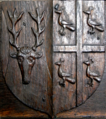Clement Smith (administrator) (original) (raw)
From Wikipedia, the free encyclopedia
Member of the Parliament of England
| The HonourableClement SmithKt | |
|---|---|
 Arms of Smith of Great Baddow: Argent, a cross gules between three peacocks azure Arms of Smith of Great Baddow: Argent, a cross gules between three peacocks azure |
|
| Member of Parliamentfor Maldon | |
| In office1545–1547 | |
| In office1547–1552 | |
| Personal details | |
| Born | c. 1515 |
| Died | 26 August 1552(1552-00-00) (aged 36–37)Little Baddow, Essex |
| Spouse | Dorothy Seymour |
| Children | Sir John SmithBennet SmithClement SmithDorothy Smith,and others ... |
| Parents | Thomas SmithIsabel Foster |
Sir Clement Smith (c. 1515 – 26 August 1552), son of Thomas Smith of Rivenhall, Essex, and Isabel, daughter of William Foster of Little Baddow, Essex, served as an administrator in the reign of Henry VIII and Edward VI.[1] He was Lord Treasurer's Remembrancer in the Exchequer (often erroneously called "Chief Baron of the Exchequer"), and was twice MP for Maldon in Essex, in 1545 and 1547.[1][2] He was knighted by Edward VI on 22 February 1547.[1]
He married Dorothy (d. 4 January 1574),[3] youngest daughter of Sir John Seymour (d. 1536) of Wulfhall in Wiltshire, sister of Queen Jane Seymour (d. 1537), third wife of King Henry VIII. The couple had three sons and four daughters, including:[4]
- Sir John Smythe (1533/4–1607), diplomat and military writer.[5]
- Bennet Smith
- Clement Smith
- Dorothy Smith, married Edmund Parker (d. 1635) of North Molton in Devon.[6] The Smith arms are visible carved in relief on an oak screen dated 1609 in North Molton Church, impaled by Parker. Notable descendants of this marriage were Baron Boringdon, later created Earl of Morley (Parker)[7] also Admiral Hyde Parker.

Parker impaling Argent, a cross gules between three peacocks azure (Smith of Little Baddow), oak screen, North Molton
Oak panelling with sculpted heraldry of Parker family of North Molton
Smith made his will on 13 July 1551, with a codicil of 10 August 1552.[4] He died at Little Baddow on 26 August 1552.[4] His widow subsequently married, before November 1553,[1] Thomas Leventhorpe (d. 8 June 1588)[3] of Shingle Hall, Hertfordshire.[4][8][9] She died 4 January 1574.[3]
- ^ a b c d Coros 1982.
- ^ Lee 1898.
- ^ a b c Andrews 1886, p. 5.
- ^ a b c d Alsop 2008.
- ^ Gause 2008.
- ^ Vivian 1895, p. 587.
- ^ Vivian 1895, p. 588.
- ^ Burke III 1836, p. 201.
- ^ Cooke & St George 1886, pp. 150–151.
- Alsop, J. D. (2008). "Smith, Sir Clement". Oxford Dictionary of National Biography (online ed.). Oxford University Press. doi:10.1093/ref:odnb/40614. (Subscription or UK public library membership required.)
- Andrews, William Frampton (1886). Memorial Brasses in Hertfordshire Churches. Hertford: Stephen Austin and Sons.
- Burke, John (1836). A Genealogical and Heraldic History of the Commoners of Great Britain and Ireland, Enjoying Territorial Possessions or High Official Rank; But Invested With Heritable Honours. Vol. III. London: Published for Henry Colburn by R. Bentley.
- Cooke, Robert; St George, Richard (1886). Metcalfe, Walter C. (ed.). The Visitations of Hertfordshire, Made by Robert Cooke, Esq., Clarencieux in 1572, Sir Richard St. George, Kt., Clarencieux in 1634 ... The Publications of the Harleian Society. Vol. XXII. London: Harleian Society.
- Coros, D.F. (1982). "Smith, Clement (by 1515-52), of Little Baddow and Rivenhall, Essex". In Bindoff, S.T. (ed.). Members. The History of Parliament: the House of Commons 1509-1558. Historyofparliamentonline.org.
- Gause, Artemis (2008). "Smythe [Smith], Sir John". Oxford Dictionary of National Biography (online ed.). Oxford University Press. doi:10.1093/ref:odnb/25832. (Subscription or UK public library membership required.)
- Lee, Sidney (1898). "Smith, John (1534?-1607)" . In Lee, Sidney (ed.). Dictionary of National Biography. Vol. 53. London: Smith, Elder & Co.
- Vivian, J. L. (1895). The Visitations of the County of Devon, Comprising the Heralds' Visitations of 1531, 1564, to 1620, with additions by J. L. Vivian. Exeter: H.S. Eland.